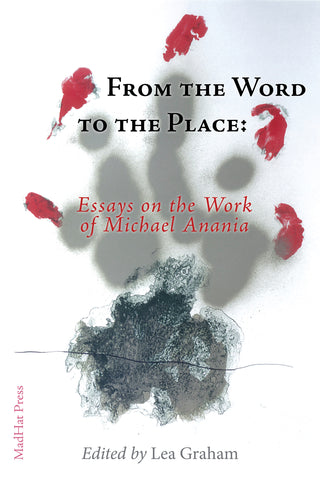From the Word to the Place ed. Lea Graham
Essays on the Work of Michael Anania
“From the Word to the Place is nothing less than a gathering of heroes lifting their hats (and hearts) to a fine presence among them and a bit beyond them as well. Such a wide array of voices! In these pages Garin Cycholl observes that Michael Anania’s El train ‘exists both in sight and melopoeically—vision invoked within anticipated sound, punctuated urban experience. The murmur of human voice in a moving car.…’ Sterling Plumpp states ‘Anania is diversity’ and ‘able to suggest the skill of a jazz trumpeter with his sudden (slick) line breaks.’ Sarah Wyman points out that ‘Anania allows the world to exist as found object,’ an observation that rhymes with lines I addressed to him in one of my books (‘No misgivings, but the continent itself’). So much about the rivers to navigate and dwell on in those Anania books! Or as Cycholl writes, ‘A restless rhythm roots itself in the litany of names.’
“But also let me remember Anania’s help through the swampy rivers of academia when years ago he wrote my school a fine fat letter to support my tenure and included, paper-clipped to the copy he sent me, a scrawled note of reassurance: ‘If this don’t fetch ’em, I don’t know Arkansaw.’”
—C. S. Giscombe
“Anania’s precursors include Ezra Pound, William Carlos Williams and Charles Olson. Like Robert Creeley, the poet he most resembles, he is interested primarily in the articulation of consciousness…. One admires the mind at work in his poems.”
—New York Times Book Review
“Moody, imagistic, strangely haunting and well-turned, Anania strums a panoply of sounds and movements that become a poetry of musical excellence on a plane with Eliot’s Preludes.…”
—Los Angeles Times
“Anania writes in obedience to his perceptions. He never condescends to his own past.”
—Washington Post
“A thoughtful and graceful writer.”
—Publishers Weekly
“Michael Anania’s poems have always been notable for their imagistic precision and delicacy of emotion…. The poet sets his scene, often in the West of his birth, rapidly—“yucca, blue flax, / pinions and their / shadows, snakeweeds”—and then goes on to draw meditative depth from what Pound would call his “luminous detail.”
—Marjorie Perloff
Paperback: 292 pages
Publisher: Madhat, Inc.
Language: English
ISBN: 978-1-952335-37-2






